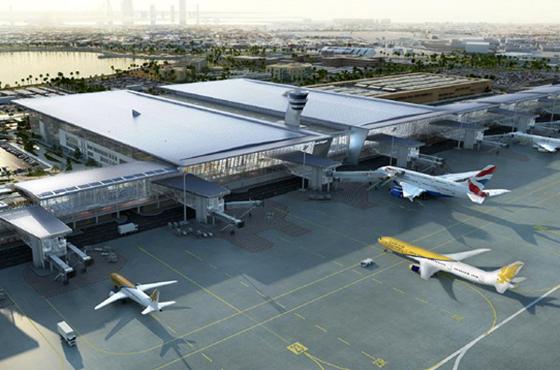Bahrain’s Ministry of Transportation and Telecommunications in June selected French technology company Thales and Switzerland’s telecoms services firm SITA as providers of Bahrain International Airport’s new security and operations management system.
The move is part of the $1.1bn Airport Modernisation Programme (AMP) launched in 2015 to develop a new 220,000-sq-metre passenger terminal and conduct renovation work at the airport, which was last upgraded in 1994.
Due to be completed in 2020, the project is being funded by the Gulf Development Fund (GDF) and should allow the airport to handle roughly 14m passengers a year, up from 8m currently.
Thales and SITA are the latest additions to the list of contractors and subcontractors working on the project. In January of last year, a joint venture comprising the UAE-based construction firm Arabtec and Turkey’s airport operator TAV was awarded the new terminal’s construction contract, with work starting last October.
Doing the ground work
Bahrain’s infrastructure project pipeline is currently valued at $32bn, according to the Bahrain Economic Development Board, and the airport’s redevelopment is a key contributor to the total. However, the kingdom’s transport ambitions are not limited to the revamped air link and plans for new and improved ground links have also gained momentum recently.
One of these is a light rail network first mooted in 2008. The most recent step towards breaking ground on the project occurred earlier this year when Spain’s Idom Consulting Engineering Architecture undertook a study into the design of the network, which is expected to be developed under a build-operate-transfer model.
Numerous road development schemes are also in the pipeline, including improvements to the Waley Al Ahd Highway Roundabout, which broke ground last month. The project aims to relieve congestion in the area by creating a new u-turn for cars entering the Shaikh Khalifa bin Salman Highway towards Shaikh Zayed Avenue.
Easing traffic congestion has also been a motivating factor behind Bahrain and Saudi Arabia’s plans for a second causeway between the two nations. Details of the King Hamad Causeway were released last month, with the new road and rail link scheduled for completion by 2023 at an estimated cost of $4bn-$5bn. The existing 25-km King Fahd Causeway between Bahrain and Saudi Arabia saw an average of 31,000 passengers per day last year, with that number expected to double by 2030, according to official figures.
The second causeway will be built under a public-private partnership model and comprise a four-lane road and 70-km railway connecting a passenger terminal at Bahrain’s Salmabad area and the freight facilities at Khalifa Bin Salman Port to the Saudi rail network. Both countries expect the rail link to be used by about 8m passengers a year by 2050, and carry about 600,000 containers and 13m tonnes of bulk freight.
A project document released at an industry event in Manama in June invited private sector players to express their interest by June 29, with project advisers expected to be appointed in the first quarter of 2018.
Spurring non-oil growth
As Bahrain’s major transport infrastructure projects make headway and both foreign and domestic companies continue to show interest in investing in them, the transport sector should be a key facilitator to fulfilling ambitions for non-oil growth.
The latest figures released by the Economic Development Board in May showed non-oil sector growth at 3.7% in 2016, while the value of the GCC Development Fund’s active projects in Bahrain doubled between the first quarter of 2016 and February this year, reaching $3.2bn. As a result, Bahrain expects to maintain its non-oil expansion above the 3% threshold through to the end of the year.
In other good news for investors, consultancy PwC noted in its January tax and legal newsletter on the Middle East that Bahrain had relaxed its measures for investors and expanded its treaties network for double taxation. The country has indeed worked on additional incentives for businesses, starting with the revision of its Commercial Companies Law and the relaxation of its visa rules last year. The former permits non-Bahraini shareholders to obtain licences for activities in new sectors like residential real estate, services and manufacturing, while the latter extends the length of visitors’ stays in Bahrain to up to 90 days.
Oxford Business Group
25 July























































